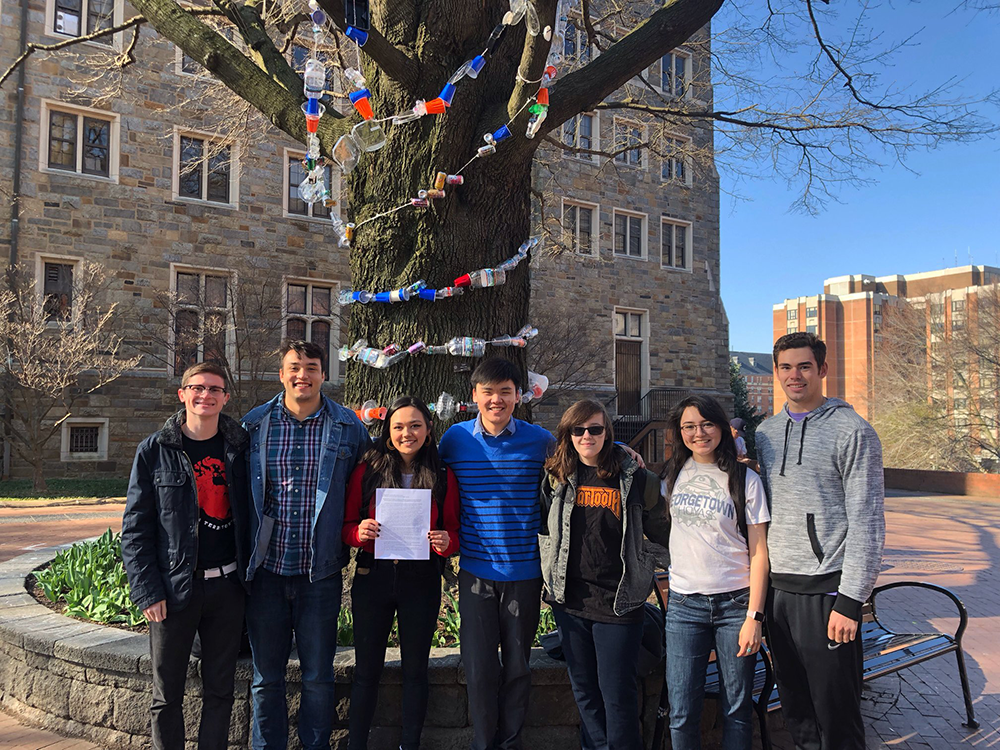The Georgetown University Student Association senate passed a resolution calling for the university to formally recognize Indigenous Peoples’ Day in place of the current mid-semester holiday at their weekly meeting Oct. 14.

The resolution, which was introduced by recently elected freshman senator Eric Lipka (COL ’23), passed the senate unanimously with two abstentions following 15 minutes of debate between senators. The measure comes months after the Native American Student Council submitted a petition to University President John J. DeGioia (CAS ’79, GRD ’95) in April 2019 calling for the same action to be taken.
The resolution will ideally encourage the university to take clear steps to recognize Indigenous Peoples’ Day, according to Lipka.
“The message that I hope this will send to the administration is that tangible action needs to be taken. By not doing so, you further diminish this community, you don’t represent all Hoyas on campus,” Lipka said in an interview with The Hoya. “I think this is a good step in the right direction to bring visibility, bring recognition, respect, to this community that has not historically received that.”
Indigenous Peoples’ Day was first proposed in 1977 during a conference at the United Nations. The indigenous individuals who proposed the change cited Columbus’ links to the genocide of Native Americans and other improprieties as reasons for the replacement of the holiday. Washington, D.C., 10 states and several U.S. cities currently recognize the new form of the celebration.
Georgetown University formally stopped recognizing Columbus Day two years ago, when the annual holiday was changed to the current mid-semester holiday. The District passed the Indigenous Peoples’ Day Emergency Declaration on Oct. 8 of this year, temporarily changing recognition of the holiday. It is a temporary, emergency declaration made to enable the D.C. Council to enact the declaration without Congressional approval, as is required with typical pieces of D.C. legislation.
Members of the NASC believes that a name change for the holiday would demonstrate Georgetown’s support of members of the indigenous community on campus, according to the group.
“Although a seemingly small feat, the impact of changing the narrative around Columbus Day into Indigenous Peoples’ Day is critically important to us as Indigenous students at Georgetown University,” the group wrote in an email to The Hoya. “It brings a sense of hope and shows that the Georgetown community recognizes our existence, humanizes our struggles, and keeps us in their thoughts and actions.”
Lipka urged the university to formally recognize the new version of the holiday in a letter obtained by The Hoya that he delivered to DeGioia on Oct. 15.
Monday’s resolution is not the first time the GUSA senate has taken up the topic of Indigenous Peoples’ Day. The current GUSA senate speaker, Juan Martinez (SFS ’20), also introduced a resolution two years ago calling on the university to change recognition of the holiday from Columbus Day to Indigenous Peoples’ Day, which passed unanimously, according to Lipka.
Freshman senator Eric Bazail Eimil (SFS ’23) was among a small group of senators who voiced concerns about the implications of the resolution. Columbus Day was originally intended to recognize Italian immigrants, according to NPR. Changing the name would be an erasure of the Italian American experience, Bazail Eimil wrote.
“My caution was to remind senators that in pushing for the elimination of Columbus Day, we are inherently forgetting and diminishing the suffering of a different group of people,” Bazail Eimil wrote.
The Georgetown Native American Law Students Association also submitted a resolution to the Student Bar Association, the Law Center’s student advocacy organization, urging the Georgetown University Law Center to recognize Indigenous Peoples’ Day, according to NALSA Vice President Kayla Gebeck (LAW ’20).
The resolution passed unanimously among SBA members Oct. 9, and NASLA plans to further petition the Law Center to implement the change, according to Gebeck.
The GUSA resolution is a positive step toward implementing Indigenous Peoples’ Day across the various Georgetown University campuses, Gebeck wrote in an email to The Hoya.
“The Georgetown Native American Law Students Association (NALSA) is very supportive of and stands with the GUSA Senate,” Gebeck wrote.
Changing the language of Columbus Day to Indigenous Peoples’ Day is a positive step towards a more inclusive environment for the indigenous community on campus and elsewhere, according to the NASC.
“Renaming the second Monday of October as Indigenous Peoples’ Day has been a long-time goal of Native American Student Council (NASC), so we believe that this is a step in the right direction,” the NASC wrote. “It shows that the hard work from not only us and our allies in NASC, but from Indigenous students before us and those outside our organization, is starting to make a tangible impact on campus culture.”




















